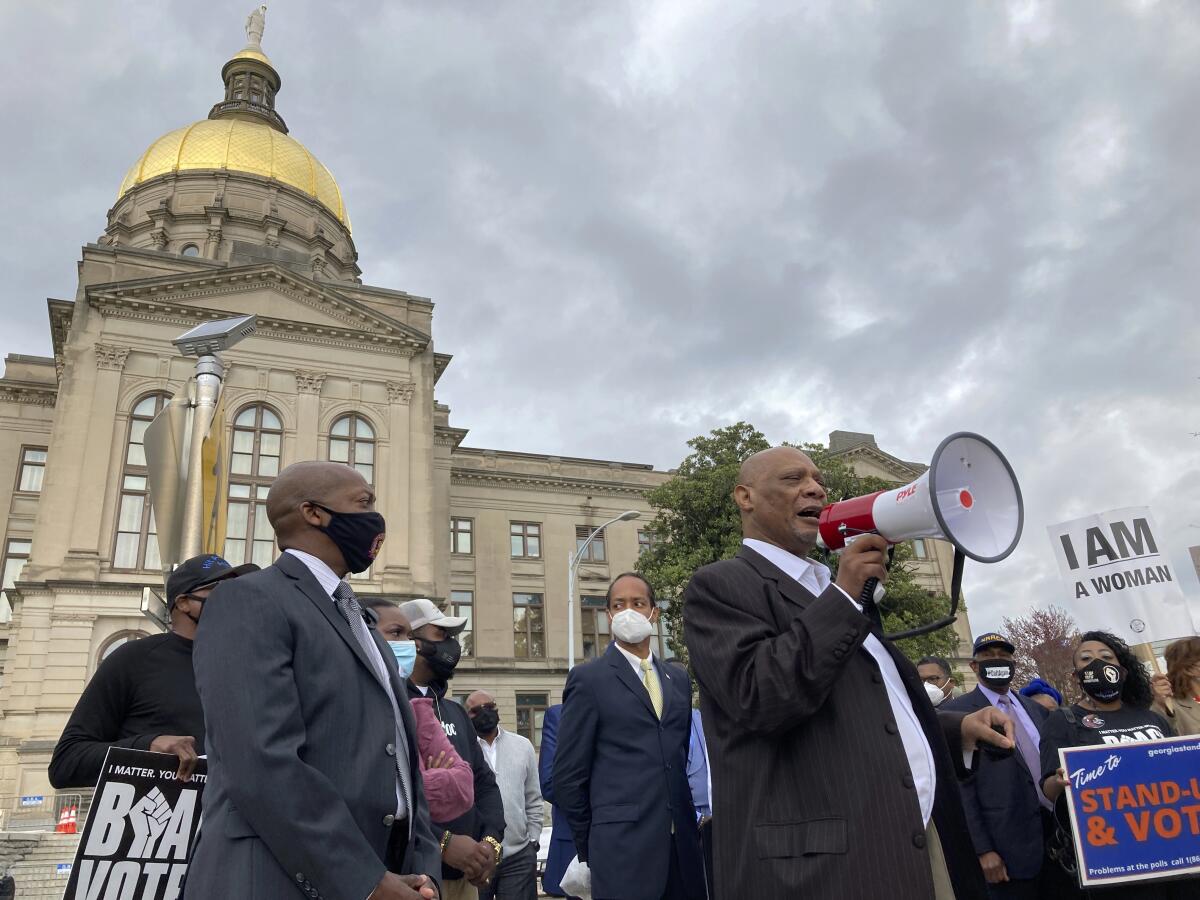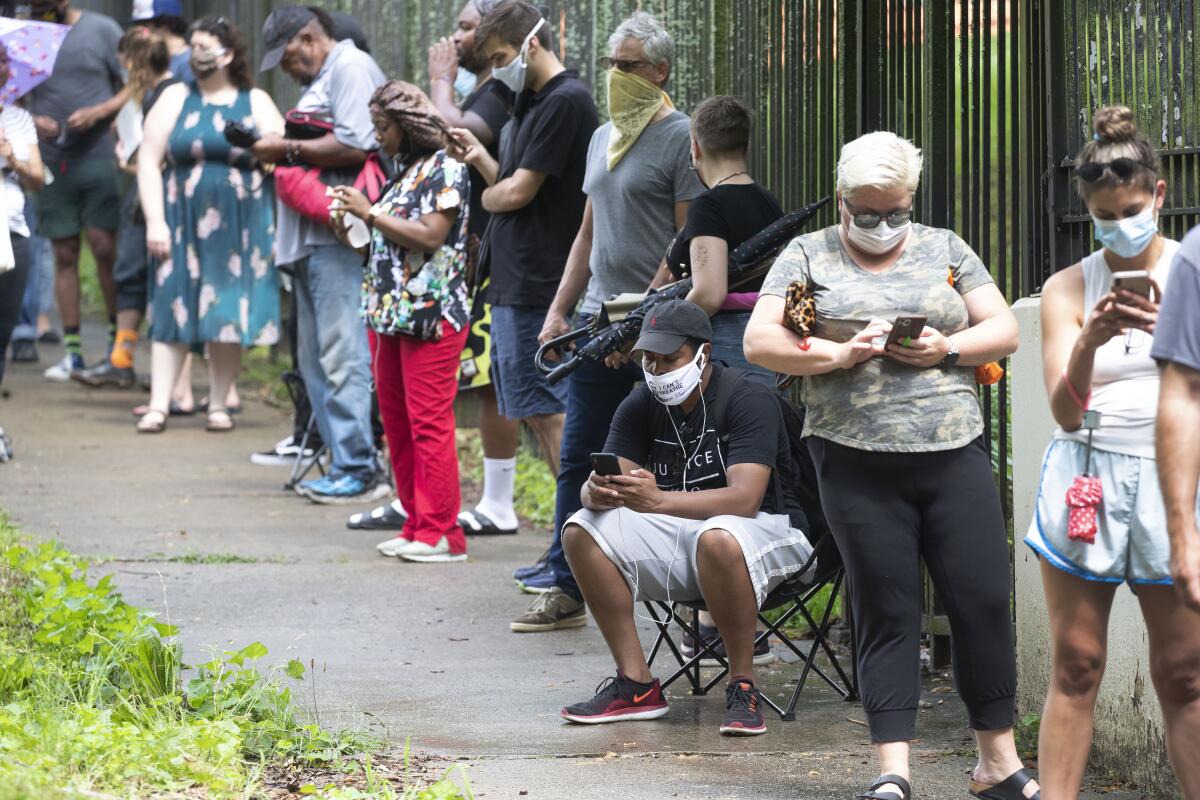Essential Politics: In the voting rights debate, Georgia gets a jolt from big business

- Share via
This is the April 7, 2021, edition of the Essential Politics newsletter. Like what you’re reading? Sign up to get it in your inbox three times a week.
There’s something about Georgia.
Over the past six months, the state has played a starring role in the 2020 presidential contest, the battle for control of the Senate and, now, a debate over voting access in future elections.
Georgia lawmakers passed, and the Republican governor quickly signed, a law giving themselves greater control over managing local elections, placing new requirements on absentee and early voting and barring advocacy groups from providing water or other refreshments to voters facing long waits. State Republicans argue that they’re simply safeguarding voting integrity, though federal and state officials have repeatedly assured the public they have found no evidence of fraud.
Then came the backlash: Voting rights advocates rallied. Under their pressure, large companies based in Georgia started releasing statements condemning the new law, stirring controversy among consumers. Major League Baseball yanked the All-Star Game from Atlanta.
The law was already a big story, a clear consequence of Republicans’ false claims that Democrats stole the White House and the Senate. But corporate activism has supercharged the issue — this week, Senate Republican leader Mitch McConnell of Kentucky denounced businesses for “behaving like a woke parallel government.”
As Georgia once again takes a turn in the national spotlight, here’s what you need to know.
Get our L.A. Times Politics newsletter
The latest news, analysis and insights from our politics team.
You may occasionally receive promotional content from the Los Angeles Times.
What’s happening with the law?
On March 25, Georgia Gov. Brian Kemp signed a package aimed at tightening the state’s voting laws, little more than an hour after the Republican-controlled state legislature passed the measure on party-line votes.
Among other restrictions, the new law:
- Allows state takeovers of local elections
- Introduces strict voter ID requirements
- Reduces the number of drop boxes for absentee ballots and limited access to them
- Bans election officials from sending absentee-ballot applications unless a registered voter asks for one
- Bars most people from offering food and water to voters waiting in line
The backlash was swift. President Biden referred to it as “Jim Crow in the 21st century” and “an atrocity.” Lawmakers were met with protestors who argued that the restrictions amounted to voter suppression that would disproportionately affect Black and Latino communities.
Within a week, the American Civil Liberties Union, NAACP Legal Defense and Educational Fund, Southern Poverty Law Center and two law firms filed a federal lawsuit challenging the restrictions. Another suit from voting rights organizations the New Georgia Project, Black Voters Matter and Rise also opposed the new laws.
On the federal level, Democrats were pushing for an overhaul of voting rights laws even before the changes in Georgia and other Republican-controlled states. Last month, House Democrats passed a bill that would set nationwide standards for federal elections, as The Times’ David Lauter wrote. It likely faces a Republican filibuster in the Senate.

Why is Georgia at the center of the controversy?
One legislative tracker from the nonpartisan Brennan Center for Justice has logged bills to tighten voting laws in 47 state legislatures. Many include similar measures, as my colleague Erin B. Logan wrote last month
On March 9, Iowa enacted changes that restrict early voting, limit ballot drop boxes and place new rules on absentee ballot procedures. Kemp signed Georgia’s similar package weeks later.
There are simple reasons Georgia has captured national attention. For one, the state has been front of mind for months. In November, Georgia voted for a Democrat for president for the first time since 1992. In early January, voters there ousted two Republican senators, tipping the balance of power in the U.S. Senate to the Democrats. And, at 98 pages, Georgia Republicans’ law is larger and more restrictive than Iowa’s changes or those pending or passed in other states so far.
Then there are more complicated reasons for the interest in Georgia: The contest over its law is both a proxy battle in Republicans’ struggle to remain competitive nationwide, even as they appeal to a narrowing base of mostly white voters, and a crucible in the country’s broader reckoning with racism.
Until 2020, Georgia was a dependably red state, handing Republican presidential candidates its electoral votes since 1996. It has had predominantly Republican representation in Congress for just as long, a Republican governor for nearly two decades, and its state legislature has flirted with a red supermajority. In choosing Biden, voters upended that status quo.
And if the wins by Democratic Sens. Jon Ossoff and Raphael Warnock in the Jan. 5 runoff elections are any indication, voting blue isn’t a fluke. As Lauter and Atlanta bureau chief Jenny Jarvie reported in December, the state is undergoing demographic changes that include an influx of Black residents. It marks a dramatic political shift in a state infamous for its history of suppressing Black voters with tactics like literacy tests, poll taxes, convoluted rules and violence.
What do companies have to do with it?
Georgia hosts the headquarters of some of the largest companies in the United States. As my colleagues Melanie Mason and Seema Mehta report, voting rights groups early on looked to corporations for backup.
Delta Air Lines and Coca-Cola came out against the new restrictions, but only after the changes had become law. On Friday, MLB announced it would move its All-Star Game out of Atlanta. Hollywood studios that take advantage of the state’s filming incentives are also facing calls to respond, as reported in The Wide Shot, Essential Politics’ sister newsletter on the entertainment business.
Of course, the counterreaction was predictable — some Republican lawmakers announced they would start drinking Pepsi.
These kinds of controversies and boycotts are hardly uncommon. Remember Starbuck’s repeated cup-design backlash from conservatives? And just look at Goya for an example of liberals’ revenge. Both liberals and conservatives have burned sneakers in response to the real or perceived politics of the manufacturers. And just last year, amid calls for racial justice, PepsiCo was the subject of criticism from some conservatives, who saw the decision to rebrand the Aunt Jemima pancake line — owned by subsidiary Quaker Oats — as “cancel culture” run amok.
(There’s also plenty to be said about the politics of American soda brands, from former President Trump’s obsession with Diet Coke to Pepsi’s controversial 2017 ad that starred model Kendall Jenner and invoked Black Lives Matter. But that’s for another newsletter!)
It’s a testament to the role that iconic corporations play in our politics. Coca-Cola and Delta aren’t among the top spenders on lobbying, but plenty of familiar names are: Facebook, Amazon, Blue Cross/Blue Shield. According to the Open Secrets database, Ossoff’s campaign received more than $1 million from PACs and individuals linked to Alphabet, Google’s parent company. Warnock also benefited from donations linked to Alphabet, plus Microsoft, Amazon, AT&T and Disney. As for their opponents? Contributors to former Republican Sens. David Perdue and Kelly Loeffler included Home Depot, Wells Fargo and Bank of America.
Some companies that have spoken out made corporate donations to state lawmakers now backing voting restrictions across the country, a watchdog report found.
Voting rights advocates in Georgia have warned against asking companies to boycott the state, as the MLB did in moving the game and as some in Hollywood have pushed to do. Instead, the advocates want the companies and organizations to leverage their significant sway for the cause.
Enjoying this newsletter? Consider subscribing to the Los Angeles Times
Your support helps us deliver the news that matters most. Become a subscriber.
The view from Washington
— From Tracy Wilkinson: The United States is considering a boycott of next year’s Olympic Games in Beijing because of China’s repression of minorities and other human rights abuses, the State Department said Tuesday.
— With tempered expectations, the U.S., Iran and five other world powers began “constructive” talks Tuesday aimed at reviving the 2015 nuclear deal that reined in Tehran’s weapons ambitions. But Wilkinson writes that resuscitation will require complicated diplomacy.
— Senate Democrats won an additional opportunity to circumvent a Republican filibuster of major legislation this year, thanks to a ruling from the Senate parliamentarian Monday. But what does that mean? Jennifer Haberkorn explains.
— Also from Haberkorn: A senior staffer to Sen. Dianne Feinstein signaled Tuesday that the senator would support circumventing the long-standing filibuster rule to enact a voting rights bill.
— Another deadly attack at the Capitol has renewed focus on the building’s security and the beleaguered police force that protects it. The police union is calling on Congress to act as officer morale declines, Logan reports.
— “Big Dan” is running for Congress as a Texas cowboy. But the story becomes a little less “yeehaw” and a lot stranger when you find out he’s a Florida law school grad, by way of a New Jersey prep school, who previously ran in Nevada, writes columnist Mark Z. Barabak.
The view from California
— From Taryn Luna and Luke Money: California is aiming to fully reopen its economy June 15, more than a year after the COVID-19 pandemic upended the lives and businesses.
— Gov. Caitlyn Jenner? Another athlete-turned-celebrity is reportedly interested in California’s top office, write Mehta and Christie D’Zurilla.
—Republican Rep. Mike Garcia faces another Democratic challenger — Simi Valley Council Member Ruth Luevanos, writes Mehta.
— A score of California lawmakers have signed on to a new bill designed to offer Golden State households free financial services. They’re aiming to assist the “unbanked” and “underbanked” as the nation seeks to address economic and racial inequities, writes Margot Roosevelt.
— Citing recent mass shootings in Orange, Boulder, Colo., and the Atlanta area, state lawmakers on Tuesday advanced a proposal for a new tax on the sale of guns and ammunition in California. The money would go to fund violence prevention programs, Patrick McGreevy reports.
Stay in touch
Keep up with breaking news on our Politics page. And are you following us on Twitter at @latimespolitics?
Did someone forward you this? Sign up here to get Essential Politics in your inbox.
Until next time, send your comments, suggestions and news tips to [email protected].
Get the L.A. Times Politics newsletter
Deeply reported insights into legislation, politics and policy from Sacramento, Washington and beyond. In your inbox three times per week.
You may occasionally receive promotional content from the Los Angeles Times.



